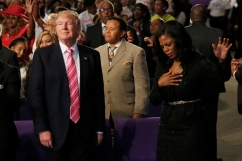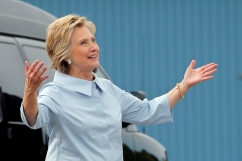What exactly is Republican Party presidential nominee Donald Trump's vision of the United States under his leadership? He wants an America with one God, swearing to one flag.
In a speech in Philadelphia on Wednesday, the controversial businessman promised to make the U.S. safe and great again, implying that this will entail unity in religious beliefs.
"Together, we will have one great American future. We will be one people, under one God, saluting one American flag. America will be a prosperous, generous and inclusive society," Trump said, according to a transcript of his speech posted by The Hill.
This is a rare mention of religion by the Republican presidential nominee, who is narrowly leading his rival, Democratic presidential nominee Hillary Clinton, in a recent CNN poll.
Trump also said that he will not continue the policies of U.S. President Barack Obama that promote division.
"We will discard the failed policies and division of the past, and embrace true American change to rebuild our economy, rebuild our inner cities, and rebuild our country," Trump said.
Talking about his national security plan, the presidential candidate emphasised his strict policy on immigrants entering the U.S.
"Immigration security is a vital part of our national security. We only want to admit people to our country who will support our values and love our people," Trump said.
Trump also took the opportunity to criticise the foreign diplomacy strategy of Clinton, who served as State Department secretary under the Obama administration. He attributed the current conflicts in the Middle East to Clinton.
"Unlike my opponent, my foreign policy will emphasise diplomacy, not destruction. Hillary Clinton's legacy in Iraq, Libya, and Syria has produced only turmoil and suffering. Her destructive policies have displaced millions of people, then she has invited the refugees into the West with no plan to screen them," Trump said.
He also pledged to protect American soldiers: "To all those who have served this nation, I say: I will never let you down. We will protect those who protect us. And we will follow their example of unity. We will work across all racial and income lines to create One American Nation."















